
Published
How it works | Accuracy | Pros and cons | Alternatives | FAQ
Editor’s take
Pros and cons
Overview
The HomeLight home value estimator is a decent starting point for sellers and buyers who want a quick estimate, but it doesn’t provide much value beyond that. HomeLight falls short of other estimators like Zillow and Redfin. For the most accurate estimate, get a comparative market analysis (CMA) report from a local realtor.
Pros
- Fast, free, and easy to use
- Company-provided accuracy rates compare favorably
Cons
- No property information provided
- A home’s condition doesn’t impact its value
- You may get contacted by HomeLight
HomeLight is one of many real estate company’s offering a free home value estimate, but it ranks as one of the worst we’ve reviewed.
While you can get a home value estimate for free, HomeLight provides no information about the property and how it determines its home values.
This estimator is good for homeowners or home buyers looking for a value estimate to compare to estimates found on other websites, like Zillow, Redfin, and Realtor.com.
How accurate is the HomeLight home value estimator?
HomeLight claims that its users can get a real-world estimate in just a couple of minutes, with its values based on public data and recent sales history. But it provides no data or context on its numbers, and we didn’t find its estimates to be that accurate.
Other home value estimators are more accurate than HomeLight and provide relevant, local home sales information. While they’re not a substitute for a home valuation from a realtor or appraiser, they can be useful for an idea of what your property is worth.
Consider comparing several of the most accurate home value estimators, like Zillow’s Zestimate and the Redfin Estimate, to get a more accurate picture of your home’s value.
How can I get the most accurate estimate?
Your most accurate home value estimate will come from a local realtor.
Unlike a home value website, a realtor can fact-check your home’s information, hand-select the best comparable sales, and give you credit for renovations and upgrades. A realtor will put all this information together in a report called a comparative market analysis (CMA).
CMAs are important for setting a competitive list price, which can help you get more money for your home.
» Learn more about CMAs | Request a free CMA from a local realtor
HomeLight home values: How does it work?
HomeLight is an online real estate company offering agent-matching services to home buyers and sellers.
Its website provides a free home value estimator, also known as an automated valuation model (AVM). It calculates a home’s value based on public records, including the most relevant, recent home sales closest to the subject property.
How to get a HomeLight home value
To get a quick estimate, visit HomeLight’s website, enter an address, and answer a few questions. We tested the process using a 3-bed, 2-bath single-family home in Hope Mills, North Carolina.
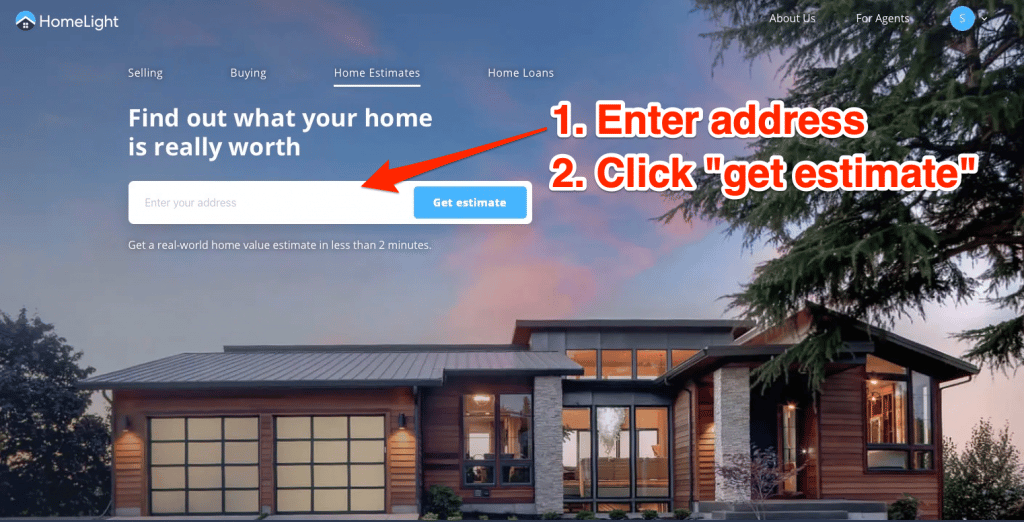
1. Enter an address
After entering an address, confirm that it’s correct.
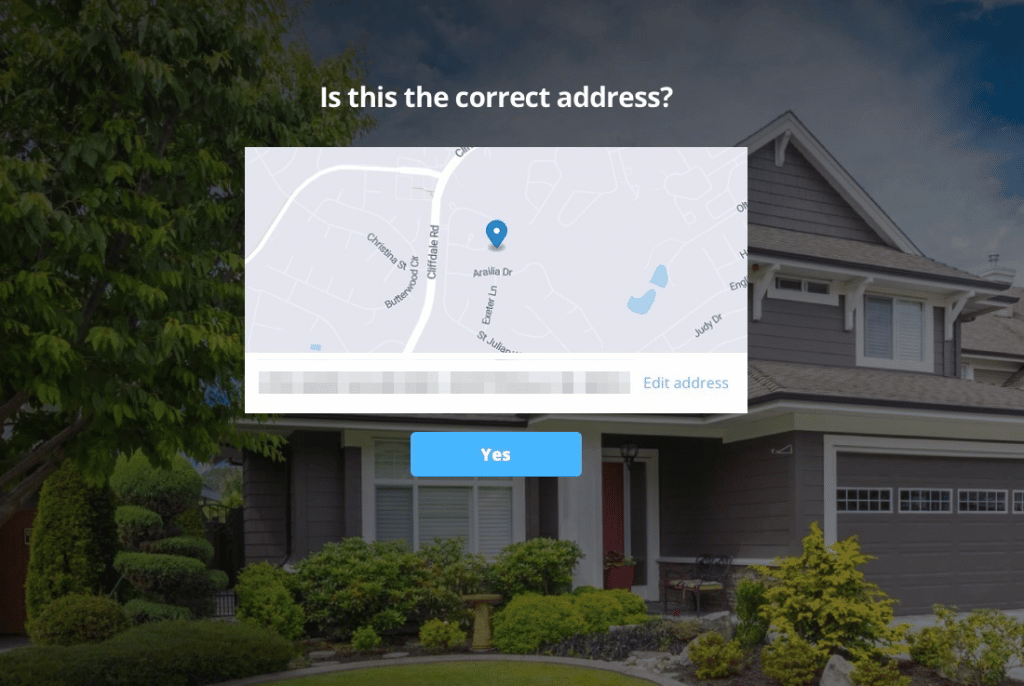
2. Timeframe for selling
HomeLight then asks if you are thinking of selling soon and within which timeframe (this will not impact your home value estimate). We answered 3-6 months.

3. Home condition
Next, HomeLight requests the condition of your home. Respond that it’s move-in ready, needs a little work, needs significant work, or if it’s in disrepair or a complete teardown. Our subject property is move-in ready.
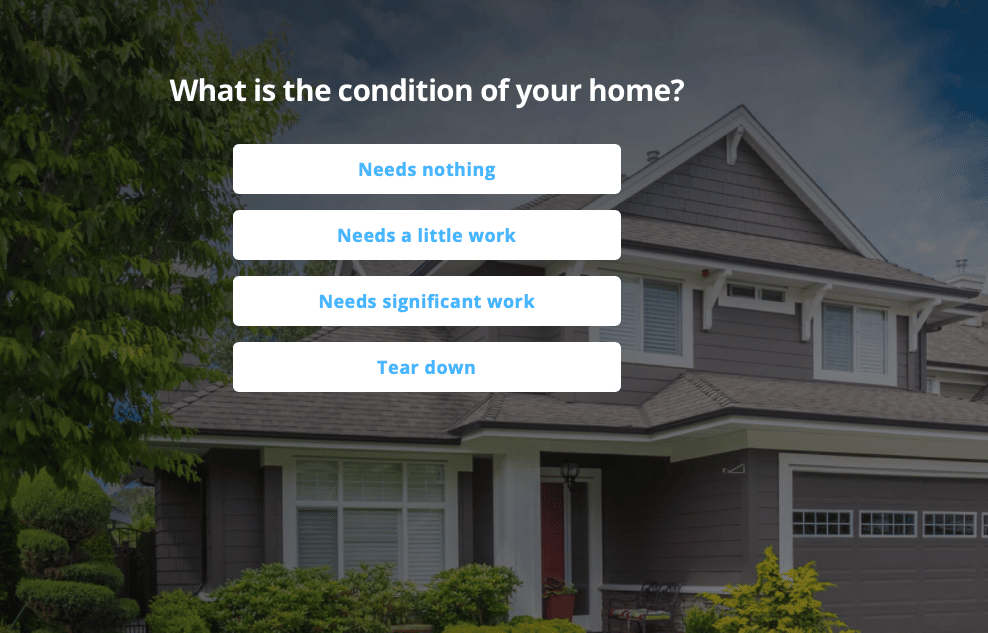
🚨 We plugged our property into HomeLight’s value estimator again and selected “tear down” to see if it returned a lower value estimate to reflect the condition. It did not. It’s not clear why HomeLight asks users this question.
4. Realtor or no realtor?
HomeLight then asks if you have a real estate agent. Like the previous question about your timeframe for selling, it has nothing to do with the value of your home. Instead, your response is likely used by HomeLight’s marketing team. We answered “no.”

5. Open question
Finally, HomeLight lets you enter any other information about your home that may be relevant. Our subject property has a newly renovated kitchen, so we added that to see if it impacts our home value.

6. Enter your personal information
Next, HomeLight asks you where you want it to send your home valuation. It requires you to enter your full name, email address, and phone number.
You must consent to HomeLight’s terms of service and privacy policy, and have HomeLight or its partners contact you via auto-dialed phone calls and text messages. Review this before submitting your information.
We entered the correct information and hit enter.
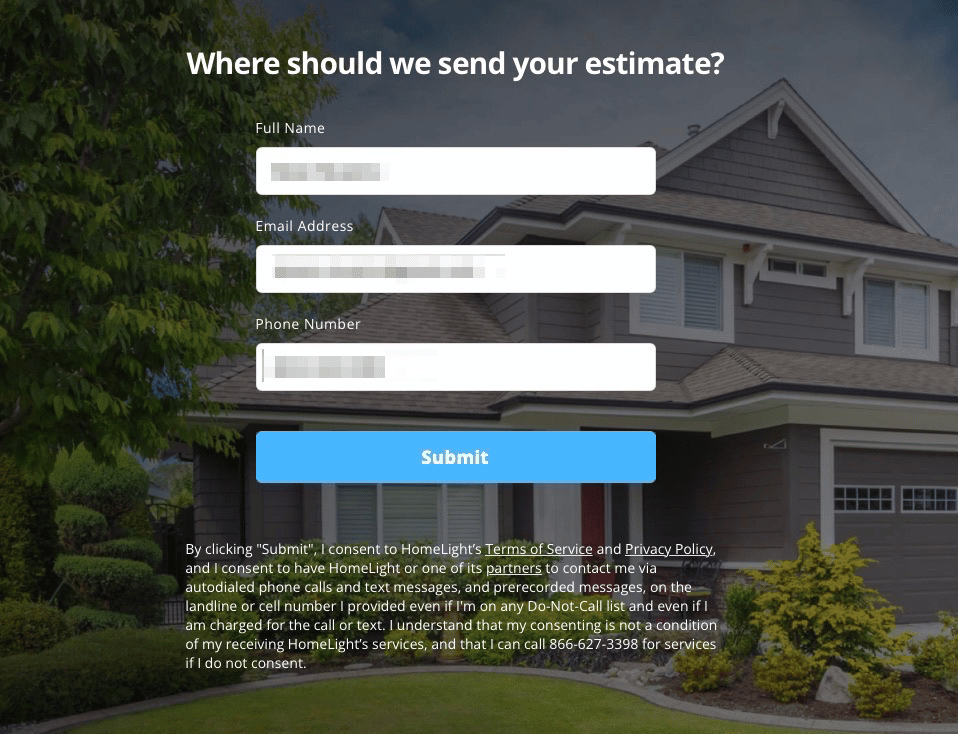
7. View your home value estimate
We received our home value estimate on the next page. Our test property has an estimated value of $156,000.
Unfortunately, HomeLight provides an estimated home value and no other details. We don’t know how it determined the value, or if it even has the correct information for our home (such as its correct bedrooms, bathrooms, and square footage).
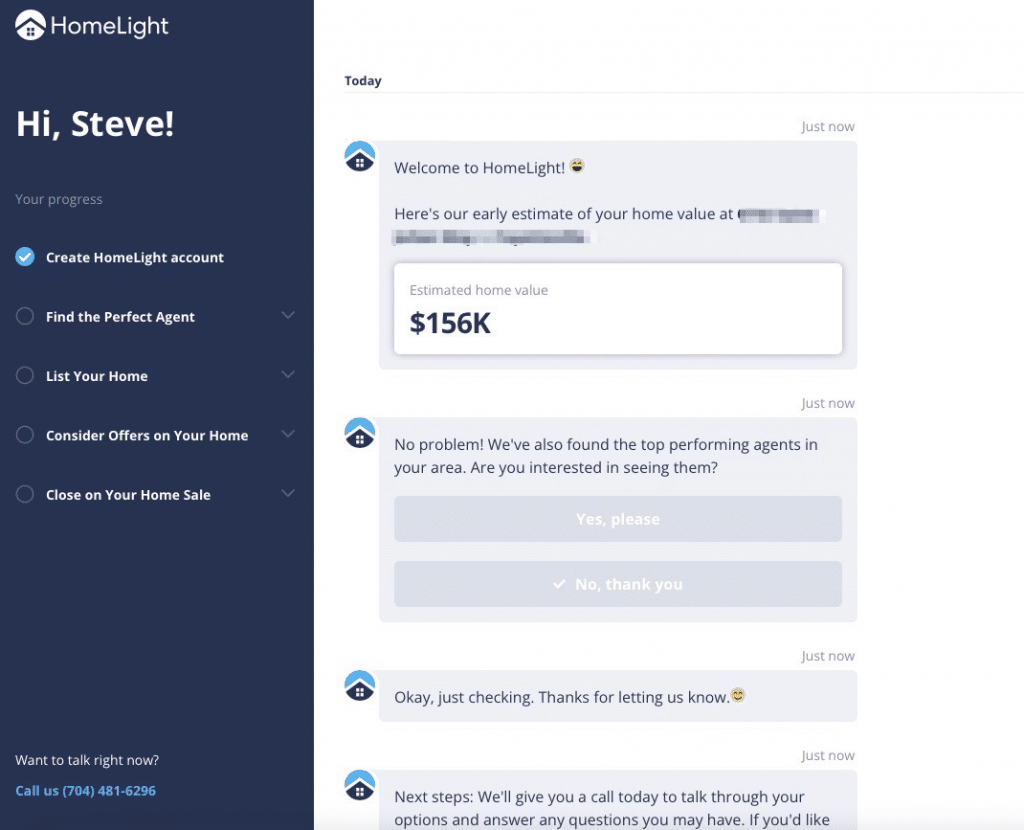
There’s also no local market information, such as recent area home sales, average sale price per square foot, or time on the market. Other top home value estimators — such as Zillow and Redfin — provide that info.
HomeLight seems more interested in trying to connect us with one of its real estate agents than in providing useful information.
We also received an email from HomeLight, with a more precise home value estimate and a callout to talk to a HomeLight realtor. Again, no details on how they arrived at the estimated value.
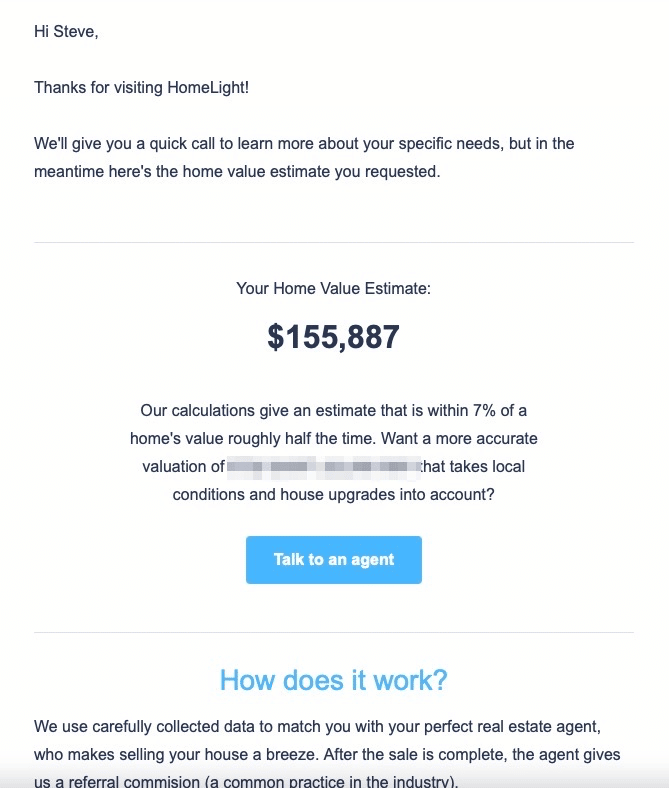
HomeLight home value accuracy
| Estimator | Accuracy |
|---|---|
| Zillow | 7.49% |
| HomeLight | 7.00% |
| Redfin | 6.47% |
HomeLight doesn’t provide users with information on how it determines its home values, other than that its estimates fall within 7% of a home’s value roughly half the time.
Its median error rate is on-par with Zillow (7.49%) and Redfin (6.47%) for off-market properties, which means that 50% of its estimates fall within the 7% error range, and 50% do not.
That means a home valued at $200,000 might have a fair market value of $186,000–214,000.
» LEARN: How accurate is a Zillow Zestimate?
HomeLight test property results
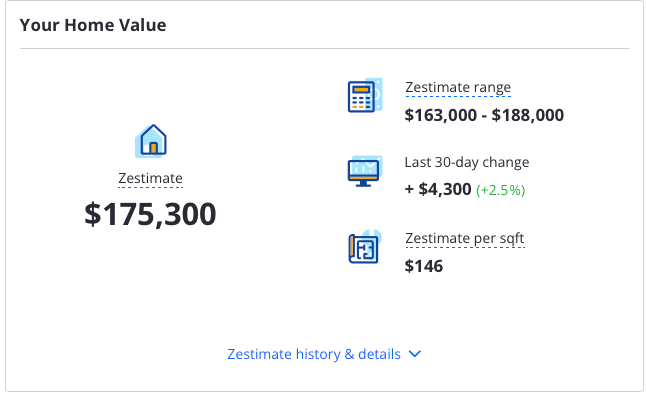
HomeLight determined that our test property has a fair market value of $155,887. We plugged the home into the most popular home value websites (including Zillow, in the above image) to see how the numbers compare.
| Estimator | Value |
|---|---|
| HomeLight | $155,887 |
| Chase | $169,700 |
| Realtor.com | $173,400 |
| Zillow | $175,300 |
| Our estimate | $175,666 |
| Bank of America | $177,264 |
| Redfin | $177,801 |
| Average value | $172,145 |
*Data pulled on August 4, 2022.
HomeLight’s estimate came in well below the others, and it’s not even close.
- The second-lowest home value estimate (Chase Bank) was nearly $14,000 higher than HomeLight’s estimate.
- The highest home value estimate (Redfin) came in at $22,000 higher than HomeLight’s estimate.
- The average home value estimate for all estimators is $172,145, or $16,258 higher than HomeLight’s estimate.
Unfortunately, we can’t tell you why HomeLight’s estimate came in so low, as HomeLight does not provide any information on how it determines its home values.
We ran the numbers and came up with a home value estimate of $175,666, based on the three most recent, relevant home sales in the immediate area. Zillow and Bank of America came the closest to our estimate.
HomeLight undervalued our test property by just over $20,000, or 11.38%.
HomeLight pros and cons
Pros
- Fast and easy
- Good accuracy rates
Cons
- Provides no information on how it calculates value
- Doesn’t consider upgrades
- HomeLight may make a lot of attempts to contact you
Fast, free, and easy to use
HomeLight’s home value tool is free and simple to use. We were able to plug in a test property address, answer a few questions, and get our home value estimate within minutes.
Accuracy rates compare favorably
Homelight says its estimator has a 7% median error rate, which is on par with other top home value websites like Zillow and Redfin.
However, our test property’s home value estimate fell well below other estimators and our estimate.
No property information provided
HomeLight provides users with a home value, and that’s about it. You don’t get any property details or information on how HomeLight determines its home value estimate.
Popular real estate websites like Zillow, Redfin, and Realtor.com, provide users with complete information on the property (beds, baths, square footage, annual taxes, etc.). Those sites also provide a list of the comparable home sales used to determine the home’s estimated value.
Condition doesn’t impact home value
HomeLight asks users about the home’s condition – if it’s move-in ready, needs a little work, needs significant work, or if it’s a complete teardown. But your answer does not impact your home valuation. And there’s no option to add in a property’s renovations or upgrades.
You might get a lot of calls, texts, and emails
HomeLight requires you to enter your name, phone number, and email address to receive a home value estimate. You must consent to have HomeLight contact you via auto-dialed phone calls, text messages, and prerecorded messages (even if you’re listed on the national do not call registry).
How HomeLight home values compare to other estimators
| Estimator | Our rating |
|---|---|
| Zillow | ★★★★☆ |
| Redfin | ★★★★☆ |
| Chase | ★★☆☆☆ |
| Ownerly | ★★☆☆☆ |
| HomeLight | ★☆☆☆☆ |
HomeLight vs. Zillow
Zillow compares favorably to HomeLight. It has a lower median error rate for off-market properties and provides a useful homeowner dashboard to edit home facts.
Unlike HomeLight, Zillow also provides a full list of recent, local home sales, so you can see how Zillow determined your home value estimate.
» MORE: Zillow home value estimator review
HomeLight vs. Redfin
Redfin is another home value website that can be useful for a ballpark home value estimate. Its website is fast, free, and easy to use, and its home values are mostly accurate compared to peers.
Redfin compares favorably to HomeLight, as it provides more information about its home value estimates. It also allows users to edit a home’s key information (which may impact its value).
However, Redfin’s home values are slightly less accurate than Zillow’s and cover fewer homes nationwide.
» LEARN: Why Redfin is one of the best home value estimators
HomeLight vs. Chase
Like HomeLight, Chase’s home value estimator is fast, free, and easy to use.
While it provides information about a property and recent home sales, we found it highly inaccurate. Its home value estimates often come in well below the home’s true fair market value.
» LEARN: Why Chase home values are too low
HomeLight vs. Ownerly
Unlike HomeLight, Ownerly provides its users with a ton of information about a property and its comparables.
However, Ownerly is the only home value website that charges its users ($1 for a 7-day trial, and then $34.99/month), and its information isn’t that reliable.
HomeLight home values: FAQ
What is the most accurate home value website?
Zillow, Redfin, and HomeLight have the lowest median error rates in the industry, at around 7% for off-market properties. However, this means they're still frequently off by tens of thousands of dollars, and home value websites often don't factor in recent upgrades, renovations, or major repairs.
The best home value websites can give you a rough ballpark estimate of a property’s value, but shouldn't be relied on to set a listing price or submit an offer on a home.
Instead, we recommend contacting a local realtor for a comparative market analysis (CMA) report. Learn more about CMAs.
How accurate are HomeLight home values?
HomeLight claims its home values carry a median error rate of about 7%, which is in line with top home value sites like Zillow and Redfin. However, our test property's home value came in well below other estimators and our estimate.
HomeLight doesn't provide any information about how it determines its home values, and it likely doesn't factor in a home's recent renovations. You may also receive phone calls, texts, and emails from HomeLight.
Is HomeLight a legitimate company?
Yes. HomeLight is a legitimate real estate company. It was founded in 2012 and is based in San Francisco, California. The company has an A+ rating from the Better Business Bureau, though it isn't accredited.
Why should you trust us?
We tested out HomeLight’s home value estimator over seven days to complete our review. We also compared the numbers to other popular home value websites and created our own home valuations on properties in multiple markets.
Based on our findings, HomeLight can provide you with a quick ballpark estimate of a home’s value, but not much else. Every home value estimator we tested (including HomeLight’s) was off by thousands of dollars.
HomeLight is the only home value website we reviewed that doesn’t provide any property information to its users. The ones that do (e.g., Zillow, Realtor, Redfin) often have the wrong (or missing) property information and use outdated home sales.
The bottom line: You can’t trust the numbers you see online on websites like HomeLight. Only an experienced, local real estate agent or appraiser can provide you with an accurate home value estimate.
About the author
Steve Nicastro is a real estate agent, investor, and personal finance writer based in South Carolina. During his time working as a full-time agent between 2020–21, he completed dozens of home value reports for homeowners.
Related reading
The Best Home Value Websites: Sites like Ownerly provide a ballpark idea of your home’s fair value. We rank the most popular home value estimators, including Zillow, Redfin, and Realtor.com.
What Is a CMA in Real Estate? A CMA is often far more accurate and useful than a home value website. Learn more about CMAs and how to get one for free from a local real estate expert.
HomeLight Reviews: Why It’s Not Worth It: Unlike its competitors, HomeLight’s agent matching service offers zero discounts on realtor commissions. Learn more about HomeLight, including your alternatives.



Leave a Reply